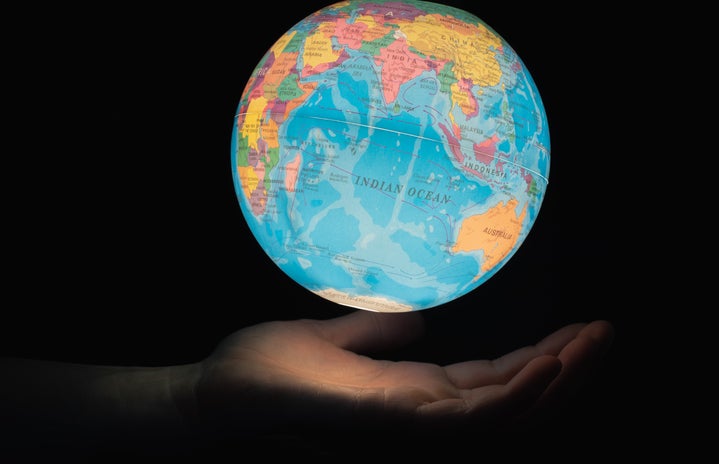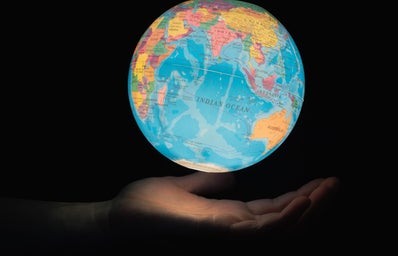Climate change has been a fixture of political discussion for at least the last decade. In my own life, I have watched opinion shift from cynical speculated theory to globally accepted precedent, at least within the scientific community. According to NASA, 97% of active climate scientists acknowledge and attribute climate change to human activity today.
Like many of my peers, the first time I learned about this phenomenon was under the term “global warming” in grade school. So, what is global warming, and how is it different from climate change?
The United Nations defines climate change as long-term shifts in temperature and weather patterns. Global warming is one of the processes responsible for such change. It refers to the warming of the planet due to increased emissions of greenhouse gasses: carbon dioxide, methane, nitrous oxide, and fluorinated gases. These gases, majorly CO2, cloak the Earth with a thick atmosphere that prevents solar radiation from reflecting out into space. Instead, the planet warms. Our teachers were right to tote the term; global warming remains one of the most prevalent causes of climate change since its measured start in the 1800s Industrial Revolution. Generating electricity, manufacturing, transportation, food production, and power consumption all contribute to the exponential increase in global greenhouse gasses and the subsequent rise in global temperature. Global warming has enormous implications for the planet, human civilizations, and global ecosystems and is linked to increasing temperatures, rising sea levels, a decrease in arable land, and inhabitable living conditions.
Unfortunately, the effects of climate change are no longer solely detectable by scientists and their sensitive equipment: the following recent natural disasters are confidently linked to climate change.
Hurricane Ian
On Sept. 28th, Hurricane Ian struck the southwest coast of Florida as a Category Four storm, bringing 150 mph winds, extensive rain, and a destructive storm surge with it. Thousands of Floridians were displaced, 2 million lost power, and over 100 lost their lives. According to Columbia University, climate change increases the strength, rain, and storm surge in existing hurricanes.
Pakistan Floods
Despite contributing little to no global fossil fuel emissions, climate change hugely impacts the nation. This year, the heavy summer monsoon season brought flash flooding that affected 33 million people and resulted in a death toll of over 1,400. In a World Weather Attribution study, computer simulations compared aspects of the event before and after the recorded 1.2°C increase post-industrial revolution. The study concluded that heavy rainfall episodes have increased in Sindh and Balochistan by 50 percent, on par with projections by The Intergovernmental Panel on Climate Change; historical records indicate the increase since the onset of climate change may be up to 75%. Today Pakistan is still in crisis with millions homeless and without access to food, clean water, hospitals, and education.
U.S., China, and Europe Droughts
Areas in the Northern Hemisphere in the U.S., China, and Europe have all experienced the effects of climate change in unprecedently warm and dry seasons. The prominent Rhine River in the Swiss Alps and the Yangtze River in China both experienced significant dips in water levels
After all of this, why do people still deny climate change?
Science is an iterative process, and despite the proven validity of findings, the nature of discovery often includes the modification of pre-existing ideas. These constant changes can lead to mistrust in their respective populations, as much of the public is unaware of the intensive scientific process and consensus behind them. Additionally, climate change research is often observational. Observational research cannot prove causation and can only suggest a relationship between two variables. Changing findings and delicate language can and have led to widespread mistrust in academic authority. This phenomenon was observed during the COVID-19 crisis. As new infectivity and exposure data became available, some interpreted the changes as a lack of vigor or honesty on the part of the scientific community. Mistakes and misleading information are a reality, but the chain of strict regulatory measures and peer reviewing ultimately do well to prevent glaring mistruths. Observational research remains a widely accepted fixture of good science.
What can we do about the state of our planet?
The good news is that there is already a lot happening to protect Planet Earth. The most extensive existing collaborative measure to combat climate change is known as the Paris Agreement, an international treaty between countries to mitigate and reduce the effects of climate change. We can all work together to make climate-conscious decisions to protect the Earth, its people, its biodiversity, and its unique ability to harbor life.


